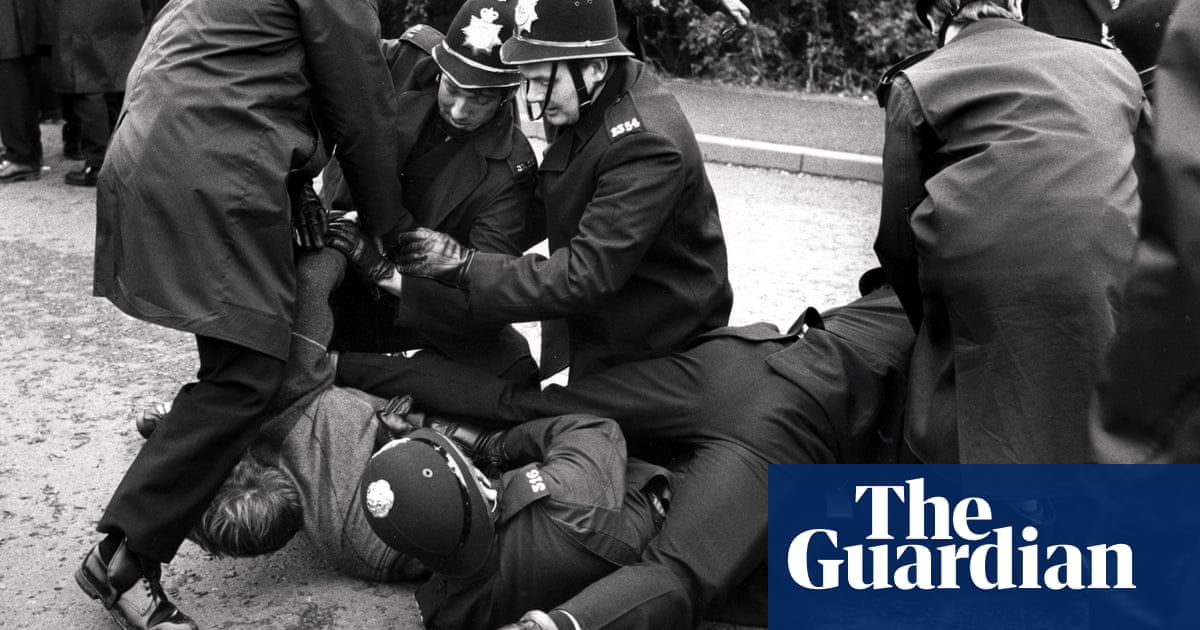Police have destroyed documents relating to the Battle of Orgreave in 1984 during the miners’ strike, which is the subject of a forthcoming official inquiry.
Northumbria police disposed of the papers less than a month before Rishi Sunak called last summer’s election, which brought the Labour party into government with a longstandingmanifesto pledgeto hold an inquiry into the scenes of violent policing at Orgreave.
In response to a freedom of information request from Joe Diviney, a PhD researcher at the University of Sheffield, the force said last week: “We can confirm that two boxes containing documents/records in relation to the miners’ strike and Orgreave were destroyed on 29 April 2024 and 30 April 2024.
“These were not moved elsewhere. As part of the records management review process they were destroyed as they were outside of the retention period.”
Kate Flannery, the secretary of theOrgreave Truth and Justice Campaign(OTJC), which has led calls for an official inquiry for a decade, said: “This is extremely disturbing news. We are now understandably worried about how many other police forces may have recently destroyed or intend to destroy important information that would be very relevant in an Orgreave inquiry or investigation.”
The violence at the Orgreave coking plant in South Yorkshire on 18 June 1984, when striking miners werecharged by police on horsebackand hit over the head by officers carrying truncheons and short shields, is remembered as the landmark confrontation of the bitter 1984-85 strike. About 8,000 miners assembled for a mass picket of the plant called by the National Union of Mineworkers, and were met by 4,500 police officers from forces nationwide, led by South Yorkshire police.
A criminal prosecution of 95 miners for the offence of riot collapsed a year later after the miners’ barristersrepeatedly accused police officers of lyingand malpractice, including that an officer’s signature on a police statement had been forged.
The OTJC has always pointed to the connection with the 1989 Hillsborough disaster, in which subsequent inquests found 97 peoplehad been unlawfully killedat the FA Cup semi-final between Liverpool and Nottingham Forest as a result of gross negligence manslaughter by the South Yorkshire police officer in command, Ch Supt David Duckenfield. The force hadmounted a false narrativeto blame Liverpool supporters after the disaster, which bereaved families fought for decades to overturn.
In 2016, when Yvette Cooper, now home secretary, was chair of the home affairs select committee, Northumbria police’s then chief constable, Steve Ashman, confirmed to her that the force held documents relating to the Orgreave operation. They included a superintendent’s report on an incident in which a constable was shown on television news hitting a miner with his truncheon.
Northumbria police sent four units, 92 officers in total, to South Yorkshire, Ashman said, and the superintendent had outlined “the management and logistics” associated with their work, including a timetable of the day at Orgreave starting at 4.50am.
One of the OTJC’s key aims has long been to see police planning documents to see if the violent policing was predetermined or a response to initial stone-throwing by miners, as the police alleged at the time.
Diviney said: “As a historian, I’m mortified that Northumbria police would destroy evidence that is of vital importance to an inquiry. I’m saddened for the miners and their families who have waited too long for truth and justice.
“It illustrates inherent problems with the police being custodians of their own evidence. And it’s another reason to hurry up with an inquiry.”
A Northumbria police spokesperson said: “We can confirm two boxes containing data in relation to the miners’ strike were disposed of in April 2024 following a formal review, retain or disposal process in line with force policy and the Data Protection Act 2018.”
Labour has promised an Orgreave inquiry since the 2017 general election, and pledged in its 2024 manifesto to “ensure, through an investigation or inquiry, that the truth about the events at Orgreave comes to light”.
Cooper wrote to the OTJC this month before the 41st anniversary of the Orgreave events, saying she was continuing to consider “the scope and format of an investigation or inquiry”, and that “my officials are working at pace”.
